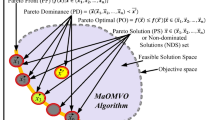Abstract
This work analyzes population size and neighborhood recombination in the context of many-objective optimization. Large populations might support better the evolutionary search to deal with the increased complexity inherent to high dimensional spaces, whereas neighborhood recombination can reduce dissimilarity between crossing individuals and would allow us to understand better the implications of a large number of solutions that are Pareto-optimal from the perspective of decision space and the operator of variation. Our aim is to understand why and how they improve the effectiveness of a dominance-based many-objective optimizer. To do that, we vary population size and analyze in detail convergence, front distribution, the distance between individuals that undergo crossover, and the distribution of solutions in objective space. We use DTLZ2 problem with m = 5 objectives in our study, revealing important properties of large populations, recombination in general, and neighborhood recombination in particular, related to convergence and distribution of solutions.
Access this chapter
Tax calculation will be finalised at checkout
Purchases are for personal use only
Preview
Unable to display preview. Download preview PDF.
Similar content being viewed by others
References
Ishibuchi, H., Tsukamoto, N., Nojima, Y.: Evolutionary Many-Objective Optimization: A Short Review. In: Proc. 2008 IEEE Congress on Evolutionary Computation, pp. 2424–2431. IEEE Press (2008)
Deb, K.: Multi-Objective Optimization using Evolutionary Algorithms. John Wiley & Sons, Chichester (2001)
Coello, C., Van Veldhuizen, D., Lamont, G.: Evolutionary Algorithms for Solving Multi-Objective Problems. Kluwer Academic Publishers, Boston (2002)
Kowatari, N., Oyama, A., Aguirre, H., Tanaka, K.: A Study on Large Population MOEA Using Adaptive Epsilon-Box Dominance and Neighborhood Recombination for Many-objective Optimization. In: Proc. Learning and Intelligent Optimization Conference, LION 6. LNCS. Springer (January 2012) (to appear)
Deb, K., Thiele, L., Laumanns, M., Zitzler, E.: Scalable Multi-Objective Optimization Test Problems. In: Proc. 2002 Congress on Evolutionary Computation, pp. 825–830. IEEE Service Center (2002)
Deb, K., Agrawal, S., Pratap, A., Meyarivan, T.: A Fast Elitist Non-Dominated Sorting Genetic Algorithm for Multi-Objective Optimization: NSGA-II, KanGAL report 200001 (2000)
Aguirre, H., Tanaka, K.: Insights on Properties of Multi-objective MNK-Landscapes. In: Proc. 2004 IEEE Congress on Evolutionary Computation, pp. 196–203. IEEE Service Center (2004)
Aguirre, H., Tanaka, K.: Working Principles, Behavior, and Performance of MOEAs on MNK-Landscapes. European Journal of Operational Research 181(3), 1670–1690 (2007)
Sato, H., Aguirre, H.E., Tanaka, K.: Genetic Diversity and Effective Crossover in Evolutionary Many-objective Optimization. In: Coello Coello, C.A. (ed.) LION 5 2011. LNCS, vol. 6683, pp. 91–105. Springer, Heidelberg (2011)
Purshouse, R.C., Fleming, P.J.: Evolutionary Many-Objective Optimisation: An Exploratory Analysis. In: Proc. IEEE CEC 2003, pp. 2066–2073 (2003)
Author information
Authors and Affiliations
Editor information
Editors and Affiliations
Rights and permissions
Copyright information
© 2012 Springer-Verlag Berlin Heidelberg
About this paper
Cite this paper
Kowatari, N., Oyama, A., Aguirre, H., Tanaka, K. (2012). Analysis on Population Size and Neighborhood Recombination on Many-Objective Optimization. In: Coello, C.A.C., Cutello, V., Deb, K., Forrest, S., Nicosia, G., Pavone, M. (eds) Parallel Problem Solving from Nature - PPSN XII. PPSN 2012. Lecture Notes in Computer Science, vol 7492. Springer, Berlin, Heidelberg. https://doi.org/10.1007/978-3-642-32964-7_3
Download citation
DOI: https://doi.org/10.1007/978-3-642-32964-7_3
Publisher Name: Springer, Berlin, Heidelberg
Print ISBN: 978-3-642-32963-0
Online ISBN: 978-3-642-32964-7
eBook Packages: Computer ScienceComputer Science (R0)




